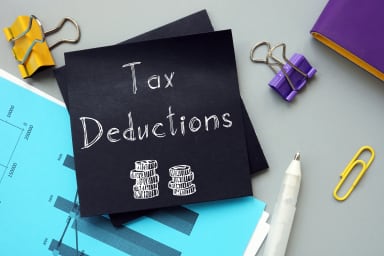If you are new to being self-employed, you may be unaware of all of the deductions that you may be eligible to take. While this article simply cannot cover all of them, there are some very important ones that you should not overlook.
Home Office
If you have an area in your home that is set aside exclusively for business, you can deduct that from your income tax. There are two different formulas you may use. The first is quite simple. You multiply the square footage of your home office by $5 and you have your deductible amount. The more complicated method involves multiplying each expense you are claiming by the percentage your office takes up in your home. While the second method may generate a larger deduction, it will also increase scrutiny from the IRS, so make sure your measurements are quite precise if using it.
Internet Fees
If you use the internet for any portion of your business, you can deduct either all or a percentage of the cost from your taxes. If you only use the internet line for business, you may deduct 100% of the cost of it. However, if you do not have a dedicated business internet connection, it is safer to simply deduct a percentage of the cost.
Vehicle
While you can’t deduct the full purchase price of a vehicle (unless you are buying a company car), there are aspects of a
If you use your personal car for business, you can take a tax deduction for the business use. You can determine the amount of the deduction either by using the standard mileage rate or by determining your actual business-related car expenses.
To use the standard mileage rate, you multiply the number of business miles driven for the year by the mileage rate allowance for that year. (56 cents a mile for 2021 and 58.5 cents a mile for 2022). To use the actual expense method, you have to determine all the costs for operating your car and multiply that number by the percent of time you use the car for business. For most self-employed, taking the mileage deduction is the easiest way to go.
Certain Equipment
If your business relies upon certain equipment to function, you can deduct not only the initial cost of the equipment but the cost of operating it as well. If the machinery is of a higher price, you may want to use the method of deduction called depreciation, which tracks its cost deduction over a period of time.
Accountant Fees
Since many deductions and the rules that surround them can be quite confusing, you may want to use the services of an accountant. Not to worry, however, as you can also deduct accounting fees associated with your business.
Licenses and Certifications
If the business you operate requires you to have specific licenses or to be certified in specific categories, the cost to you of obtaining them is completely deductible from your income tax.
Similarly, you can deduct the cost of courses, workshops and training for your business if they maintain or improve your skills in the business, or the training is required to maintain your license. You cannot deduct the cost of education or training pursued to meet the minimum requirements of your business or to qualify you for a new business.
Travel Expenses
If you need to travel for business, keep those receipts for hotel, rental cars, cab fees, parking fees, tolls, and other travel expenses as those can be deducted when figuring out how much you owe at the end of the year.
Disclaimer: The content on this page is for informational purposes only, and does not constitute legal, tax, or accounting advice. If you have specific questions about any of these topics, seek the counsel of a licensed professional.
Tax Information and Resources







